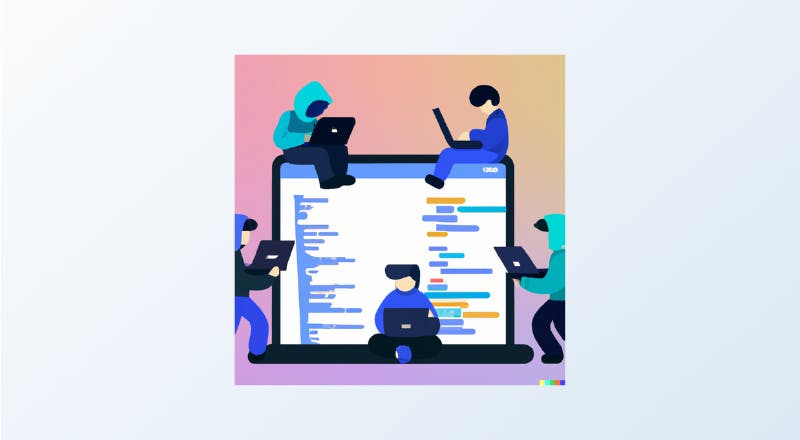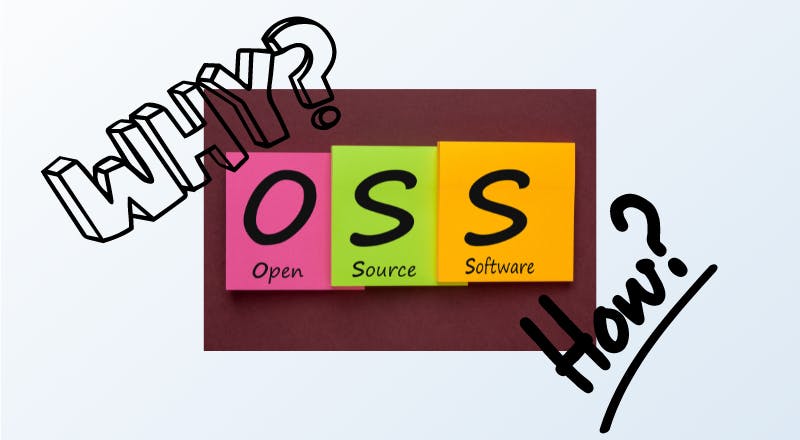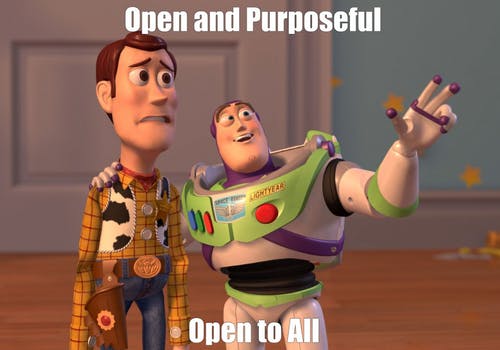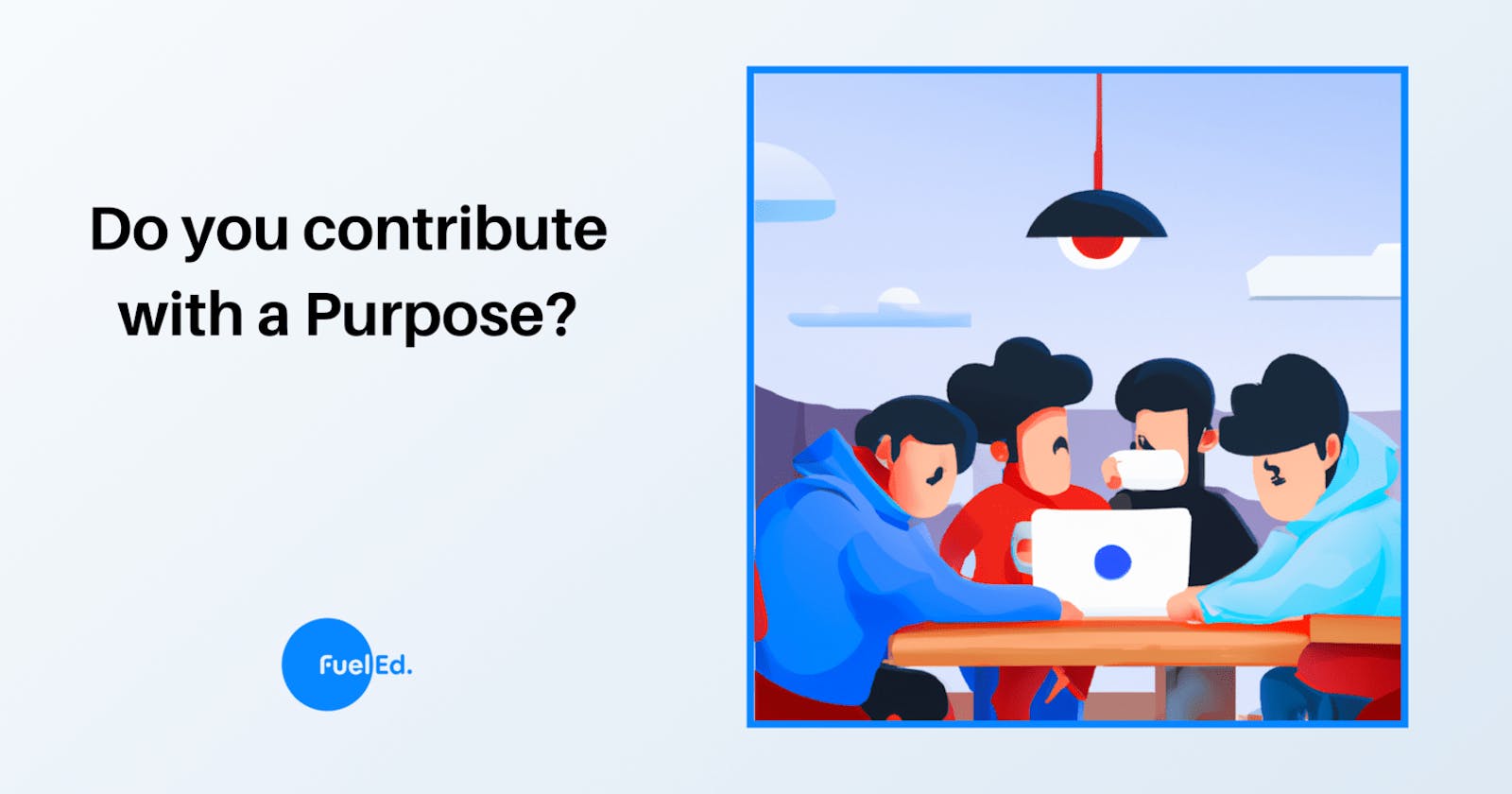Open source has witnessed an immense surge over the last few years. With a constant increase in developers stepping into it, the barrier to contributing purposefully keeps getting higher. However, all know the benefits and importance of contributing to open source. It has become a sure-shot passage for new beginners to step ahead, and the communities involved often provide a great networking opportunity with other developers.
But the question is - How do you contribute to open-source purposefully? What does it mean to make purposeful contributions? In this article, I demonstrate how to contribute to open source purposefully.
Just a Contribution v/s Purposeful Contribution.
Nobody gives this a thought, but yes, there is a difference between contributing for the namesake and contributing purposefully. It is the intent of the developer and the result achieved. Let's take an example: Mine! When I heard about open source, I thought: 'Yeah, I can do that. No big deal'. I found some beginner-friendly repositories, dug out a few no-code pull requests, and merged them.
My intent? To raise PRs that get merged. Heck, I contributed to a Python repo when all I knew was JavaScript. The result I produced? Nothing significant. I spotted some minor grammatical and spelling mistakes and updated Readme, that's all. Of course, these changes also contributed to the project's betterment, and I learned how to fork, raise PRs, and much more. But open source is much more than that.
It has to be purposeful to make you and the project win. The word purposeful arises mainly from the intent you enter open source with.
But if you're there to contribute just for the sake of it, get PRs merged, obtain swags, and all, you must read our previous article: Fake Open Source Hype. Gotta open y’all eyes!
Figure Out your Perspective of Open Source

We all know what open source is. While the actual definition is the same for all, the view of open source may differ from person to person. It may mean one thing for me while something else for you. To help you decide that, I'll state what open source means to me.
My perspective of open source has changed over time and might keep changing based on how my values for software and programming change. But first, let's hear a few views I've come across over time:
For some, open source is just some idiots giving out free software code that anyone can copy/re-distribute to make their job easier and possibly make money out of it.
For others, it's an amazing set of developers who code for and with the community.
Some love it enough to work on these OSS(Open Source Software) projects while doing their day job, and some have crossed limits in terms of helping the community that they can earn off of the donations from their work.
For me, open source is being able to share and read code from other developers. It has taught me to keep my options open and let my opinions run wild. Moreover, I also think of open source as a passageway of amazing ideas that can be rebuilt and improved.
See? The definitions and perspectives are always similar yet unique to one. Now, if you want to enter the open source and contribute purposefully, it's critical to figure out your perspective of open source.
How to Contribute to Open Source Purposefully?
If you are a complete beginner to open source, there are a few things you need to understand: Working of open source projects, your skills, motive, way of contribution, etc. I've devised some steps that you should go through in sequence while starting open source:

1- Figure out how open-source projects work
Before getting into anything, it's evident that you know how things work. You can't just shoot blindly. The same goes for Open Source. Figure out the ins and outs of it: What are maintainers and contributors, how to raise issues, requests, pull requests, ways to contribute, etc.?
Open source is super easy to get started with. You only need to know your role, raising issues & requests, and GitHub functionalities. Once you are in the open source venture with basic knowledge, the sky is the limit.
2- Why do you wish to contribute?
What is the reason you want to contribute to an open-source project? Is it to improve the software you rely on? Do you want to network with other developers and build a product together? Or do you wish to upskill yourself?
There can be several reasons, but you must choose one. Metro can't just run on tracks without a destination. Similarly, your 'why' is the destination of your open-source journey. This 'why' is your key to contributing purposefully.
3- How do you wish to contribute?
I can probably write a whole article on this particular section, and yes, I will. Later (stay tuned). But for now, know that open-source contribution is not limited to code. You can contribute to a project by contributing to design, documentation, planning events, networking, marketing, and of course, code. Decide how you want to chip in.
If you're good at code, contribute to code. If you're good at writing, contribute to the Readme file and other docs. If you're good at designing, design possible UIs and solutions.
28% of casual contributions to open source are documentation, such as a typo fix, reformatting, or writing a translation.
Open source doesn't force you to work on software projects and contribute with code. It is much-much-more than that!
4- Find a project to contribute to
You're all set. You know how open source works, what is your reason for stepping in, and how you're going to contribute. All done, but the project that everything revolves around xD. Not to worry.
John F. Kennedy once said, "Ask not what your country can do for you - ask what you can do for your country.*"* Yes, you need to find a project where you (your skills) can provide value.
Contributing to open source happens at all levels across all projects. Hence, you need not worry about the type of contribution you can start with. Instead, look at the OSS(Open Source Software) you already use or admire.
The best way is to choose the projects you find yourself coming back to. Within those projects, whenever you find that something could be better or different, that's your cue to act.
But, Don't put up with any Crap!

Gordon-McKeon, program director at OpenHatch, said in an interview, "You don't have to settle for the places that are toxic and non-welcoming. A big part of being comfortable in the open source space is being confident."
And that's true. The open-source community has often been called Rough-and-Rude, especially for women. To your surprise, only 11% of the global open-source contributors are female.
Regardless of race, gender, and seniority: Open source isn't an exclusive club. It's made by people, just like you and me. Hence, a purposeful contribution can only happen where you don't have to deal with rough-and-tumble crap.
Open source is supposed to be Open and Purposeful, after all - FuelEd

